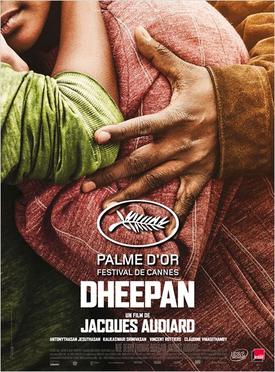
Dheepan is one of the most critically acclaimed films of 2015, having won the famed Palme d’Or at the Cannes Film Festival. Director Jacques Audiard (A Prophet, Rust and Bone) crafts an immersive film around the story of Sivadhasan (Jesuthasan Antonythasan), a former Tamil Tiger who assumes the identity of a deceased man, Dheepan, in order to secure asylum in France. He is thrown together with strangers in a Sri Lankan refugee camp who take on fake identities as his wife Yalani (Kalieaswari Srinivasan) and nine-year-old daughter Illayaal (Claudine Vinasithamby).
Audiard has demonstrated a passion and skill for telling the stories of those at the margins, and Dheepan is no exception. We follow the newly formed “family” through the typical struggles of assimilation (Illayaal serves as translator for her parents, Yalani introduces the French to the wonders of Sri Lankan cuisine). Layered on to this familiar story, and what makes the film truly unique, is the struggle of these strangers to fit into the roles they are forced to assume — father, mother and daughter.
The trauma the trio fled in Sri Lanka proves difficult to escape. Dheepan gets a job as a caretaker in their rundown housing complex, which turns out to be a hotbed for criminal activity. Old comrades from Sri Lanka come calling, pressuring him to take up his old ways. While the prospect of a new life seems tantalizingly close, so too does a fall back into violence and chaos. As the film rolls on, you sense that Audiard is methodically packing a tinderbox, and it is only a matter of time before the match is struck.
When the film finally takes a decisive turn, the shift is jarring, and the tightly spun narrative quickly unravels in a thrilling, though not entirely satisfying ending.
Antonythasan delivers a standout performance as the brooding and distraught Dheepan, but the entire cast pulls its weight, particularly Srinivasan with her portrayal of Yalani. Rather than being boxed into familiar tropes, we see all sides of her character burst forth on screen — both tender and cold, frantic and poised — the type of clashes you would expect of someone thrust into a new life in a strange culture.
Given the subject matter, it is impossible to avoid comparisons to the current refugee crisis in Europe, and particularly, the ability of countries like France to accommodate refugees, or not.
In his acceptance of the Palme d’Or, Audiard remarked that he hopes the film draws attention to the plight of refugees, but we should be wary of reading too much commentary into a film whose real strength is moments of stolen intimacy between strangers in a foreign land, or as Audiard puts it, “the history of love constructed in front of our eyes.”
* * *
Ashwin Warrior lives in the California Bay Area and works in non-profit communications, promoting social good and supporting progressive causes and organizations. You can follow him on Twitter at @ashwinwarrior and see other things he’s written here.












